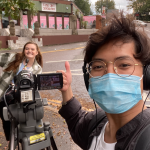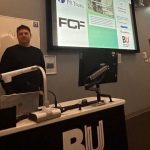 Produced by Guest blogger
Produced by Guest blogger
 I live locally so it was an easy choice to make studying at Bournemouth University. Coupled with Bournemouth being ranked number 3 in the 2024 Complete University Guide for graduate prospects, it was an easy decision.
I live locally so it was an easy choice to make studying at Bournemouth University. Coupled with Bournemouth being ranked number 3 in the 2024 Complete University Guide for graduate prospects, it was an easy decision.
The university works closely with local law firms, creating a great foundation for students at BU to pursue a career locally if desired.
The ‘Future Fridays’ events held throughout the semester provided a great opportunity to meet the local law firms and gain insight not only into how they work but also how the profession operates, giving really useful and insightful tips to make for a successful career.
Each session focused on a different topic. Some of these were, how to network with professionals, what the SQE entails, the art of advocacy, and how to get the most out of LinkedIn. These sessions hosted by law professionals provided a real opportunity to build key skills to ensure a successful career in the legal sector.
Another event I participated in was the legal skills conference organised by the university’s academics. This also provided invaluable techniques on how to succeed in your studies and how these skills can be used post-graduation and beyond. The workshops included:
- Critical analysis
- Comparative law
- Legal realism versus legal formalism
- Combating nerves and anxiety in presentations and interviews.
Following the conference, we then had an opportunity to ‘meet the firm’, where a keynote speech was given by the managing partner, Matthew Fretten of Fretten’s Solicitors in Christchurch, with a drink’s reception held afterward. Being able to speak to a law firm in a relaxed environment and find out what they look for in prospective employees was incredibly beneficial.
The university also runs research projects that students can participate in. I have been fortunate enough to obtain a place on the ‘Missing Persons Indicator Project’ run by Professor Melanie Klinkner. This entails looking at context indicators of how countries deal with their missing persons and collating data that helps better understand how states engage with and seek to solve missing persons cases. I am part of a team of students responsible for researching specific countries and what treaties they are signed up to, as well as pinpointing what context indicators could potentially affect how they deal with missing persons, such as natural disasters.
Whilst the prospect of networking and talking to legal professionals can be daunting, pushing myself out of my comfort zone has enabled me to benefit from all the university has to offer. My experience has been incredibly inclusive and encouraging, there is so much support available when you take every opportunity available. The lecturers give you all the tools available for success, by way of appointments pre-assessment, help and guidance videos, and feedback sessions post-assessment to build on what you have already achieved.
If you are willing to work hard and engage with the process, the rewards are there for the taking.

 Chiedozie’s experience with guest speaker Lubna Shuja
Chiedozie’s experience with guest speaker Lubna Shuja News Days: The best part of my course so far…
News Days: The best part of my course so far… Reflections…what did Bournemouth University teach me?
Reflections…what did Bournemouth University teach me? Why you should study TV Production at Bournemouth University
Why you should study TV Production at Bournemouth University








